Digging Beyond the Surface
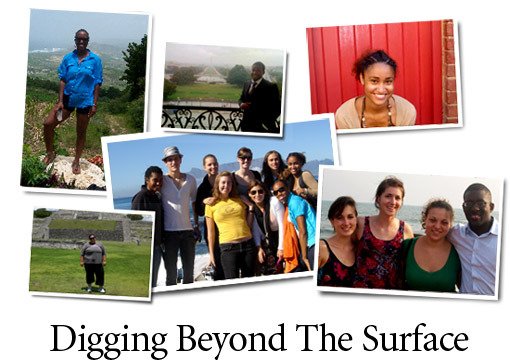
From African dance and contemporary jazz to colonialism and urban education, students of Black Studies at Swarthmore explore the history, culture and society, political, and economic conditions of Black people in the United States, Africa, and elsewhere in the Black Diaspora. Below are stories from students who are in the midst of that exploration and those who have used it to form the basis of their current work.
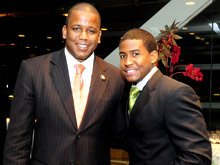
Randall Keith Benjamin, who majored in political science with a minor in Black Studies, now works on Capitol Hill in the office of Representative Kendrick Meek (D-FL, left).
One of the tools Black Studies equipped me with was the ability to neither be silent nor deterred by the issues that were and are pertinent to Black folk. I am very clear that for the world to improve, all hands must be on deck. I also am clear about what part I believe I will be able to play in making that happen.
Working on Capitol Hill in Representative Kendrick Meek's office gives me an inside look into how policy and politics both negatively and positively affect the lives of my community and the continued push for progress. Personally, I more enjoy being in the trenches directly serving the people, but I understand how critical it is to be well versed in all the issues, agencies, and levels of government that can either be a hindrance or help. Before a solution can ever be achieved, all the problems must be acknowledged.
As students, Black Studies constantly challenged us to be conscious and aware of all sides of an argument or opinion before coming to a conclusion or proposing an answer. We were forced to dig beyond the surface.

Randall Keith Benjamin II '09
Congressional Black Caucus Foundation Emerging Leader Intern
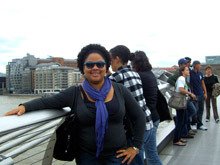
Sylvia is a co-cordinator of Dare 2 Soar, a tutoring and mentoring program for elementary and middle school students in Chester, Pa. She is also a member of the Womyn of Color Collective and a host of Kiss My Sass Radio on WSRN.
Studying abroad in London last year gave me the opportunity to explore notions of race and to deconstruct previous assumptions I had made. Not only did I come to a better understanding of myself as a Black person, my place in the Black Diaspora, and the importance of Black Studies, but hearing different Black British perspectives in classes such as Immigration and Culture in Africa allowed me to explore ideas of the meaning of 'Blackness' and to what extent we can all call ourselves Black.
In London, I also had the chance to see Kwame Kwei-Armah's play Seize The Day, which looked at the possibility of having a Black Mayor of London. Seeing this play, which was part of the Not Black and White series, was especially interesting after Obama's election. This allowed me to compare and contrast experiences in the U.S. and England.
Overall, my stay in London was life-changing both personally and academically. There are so many questions I have yet to answer about my own identity and Black people in the global context. I am excited to continue this exploration at Swarthmore.

Sylvia Boateng '11
Educational studies and political science major
with a minor in Black Studies
Allentown, Pa.
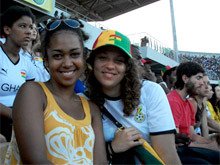
Shameika studied abroad in Ghana, where Swarthmore offers programs in dance, theater, and environmental studies.
As a special major in Black Studies, it is vital that I understand and experience the origin of the African Diaspora first hand. Studying abroad at the University of Ghana in Legon offers me a great place to further develop my personal understanding of the African Diaspora. As a major point of departure for the African slave trade, the home to Pan-Africanism and Kwame Nkruma, and resting place of W.E.B. DuBois, Ghana is a wealth of knowledge for Black Studies.
My program here includes African drumming, which is the most enriching and challenging class I have. I now have actually seen where hip-hop is derived from. Twi, the language class, is another one of my favorites. I did not quite realize how much a culture is encompassed by its language until now.
I was also able to go to the FIFA 4th Division World Cup soccer match between Ghana and Sudan. It was great to see Ghana win!

Shameika Black '11
Black Studies major
Burien, Wash.
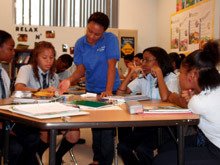
As a Lang Scholar, Kylah established a resource center for young women in Chester, Pa. Her work continues in the classroom, where she now shares some of the lessons she learned at Swarthmore.
As a first year literacy teacher at Mariana Bracetti Academy and graduate student at the University of Pennsylvania working towards a master's of science degree in Urban Education, I consider it a privilege to have been a part of Swarthmore's Black Studies program. With the interdisciplinary knowledge gleaned from my Black Studies courses, I have been able to expose my students to a diverse array of writings of the Diaspora which challenge them to think both critically and analytically about various texts. Today, my students are beginning to appreciate diversity of perspective. They possess the keen ability to examine text through multiple frames, creating text to life connections on a daily basis. It's a skill I learned as a Black Studies student and now am able to teach my ninth graders.

Kylah Field '09
Teacher, Mariana Bracetti Academy
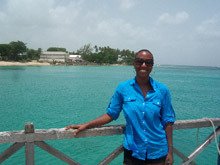
At Princeton, Justene is studying the formation of informal and clandestine economies within enslaved communities in the United States and the British West Indies, specifically the ways in which gender shaped participation in informal economic activities. She graduated from Swarthmore with a B.A. in Spanish.
My academic experiences in various Black Studies classes at Swarthmore piqued my interest in the experiences of African-American women, particularly within the institution of American slavery. Then, as a master's student in African and African Diaspora Studies at Florida International University, I completed a thesis on the urban life of enslaved women in colonial Newport, R.I. Last summer, I spent a month doing pre-dissertation research in beautiful Barbados. While there, I traveled to multiple archives on the island in search of anything that might reveal how informal economic activities of enslaved people were regulated during the 18th and 19th centuries. I spent several weeks reading wills, court records, legal statutes, and newspaper articles. My trip was amazing and I can't wait to return!

Justene Hill '04
Ph.D. candidate in history, Princeton University
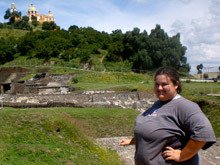
Cecilia is a co-founder of the Swarthmore Womyn of Color Collective and is involved in a variety of other student organizations, including COLORS, an organization for the LGBT community, and Enlace, a Latino student group.
I recently returned from studying abroad in Mexico, where I had the amazing opportunity to compare my studies of race and ethnicity in the United States with the complicated history of Spanish conquest in Mexico. Race is constructed differently there than in the U.S. and is complicated by the normalized "Mestizo" identity that upholds light-skinned hierarchies.
My experience began in Cuernavaca, Mexico, where I visited Cortes Palace and various Base Christian Communities. I also heard from different activists and organizers in the area. The Cuernavaca campus of the Center for Global Education kicked off its first ever Gay Straight Alliance and we met to help plan events and discuss how we could make the program more accessible to queer and questioning students.
Then I had the opportunity to travel to El Salvador for 10 days and learn about the complicated history of U.S. foreign policy there and in Central America generally. We traveled all around El Salvador from the main city of San Salvador to the mountain area of Perquín, and then the rural community of Nueva Esperanza. Finally, we traveled to Mexico City for a week-long seminar on gender and sexuality in Mexico, where we learned about the intersections of Mexican culture and identity with issues of gender and sexuality.

Cecilia Marquez '11
Black Studies major with a minor in Gender and Sexuality Studies
Arlington, Va.
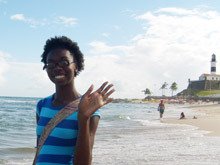
Sable is a co-coordinator of Dare2Soar, a tutoring program in Chester, Pa., a co-founder of the Swarthmore Womyn of Color Collective, and a co-host of Kiss My Sass Radio on WSRN. Last year, she received the Black Alumni Prize for "exemplary academic performance and community service."
Going to Brasil was an amazing experience for me as a Black Studies major. I was able to connect with people with African descent in a different cultural context and witness the legacy of slavery in what felt like a time entirely distant from the present. At the end of my time there, many of my previous understandings of socially and historically constructed realities, such as race, class, gender, nationality, language, and color identities, were radically changed. My time in Bahia, the Black capital of Brasil, is a time I will always cherish and hold dear to my heart.

Sable Mensah '11
Black Studies major
Bronx, N.Y.
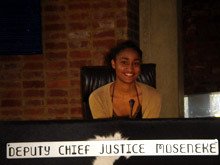
A Lang Scholar, Ashia says her ultimate goal is to enter education policy and "revamp the way we think about education and how it is delivered in under-served communities." To that end, she co-founded Project Shingayi to empower the youth of Zimbabwe by offering them an education in a way that values their community and culture."
As a Black Studies Program student, I am very interested in the social construction of race as a global phenomenon. Accordingly, I have chosen a study abroad program focused on multiculturalism and social change in a country that, for a long time, has been plagued by issues of race.
I started my study abroad experience in Johannesburg, South Africa, where we visited the Hector Pieterson Memorial, the Apartheid Museum, and Nelson Mandela's former and current homes. From there, we moved to Cape Town, where we have visited the Direct Action Center for Peace and Memory, Robben Island, and Camps Bay. Our cultural contact heightened as we moved into homestays and tried local specialties very different from food at home.
Being in South Africa allowed me to study not only how race relations play out there, but in the U.S. as well. The parallels between the history of the two countries are amazing.

Ashia Troiano '11 History Education major with a minor in Black Studies
New York, N.Y.


